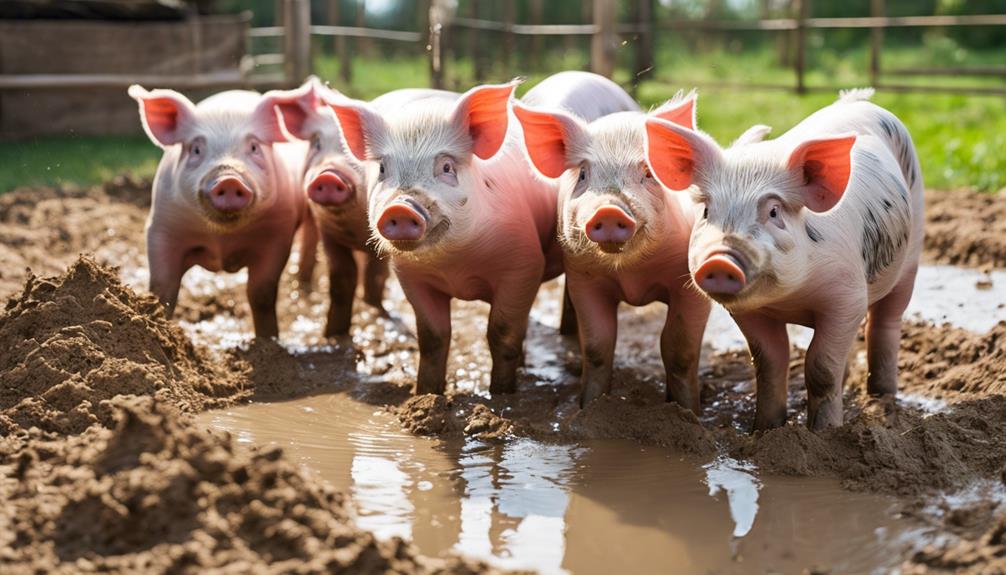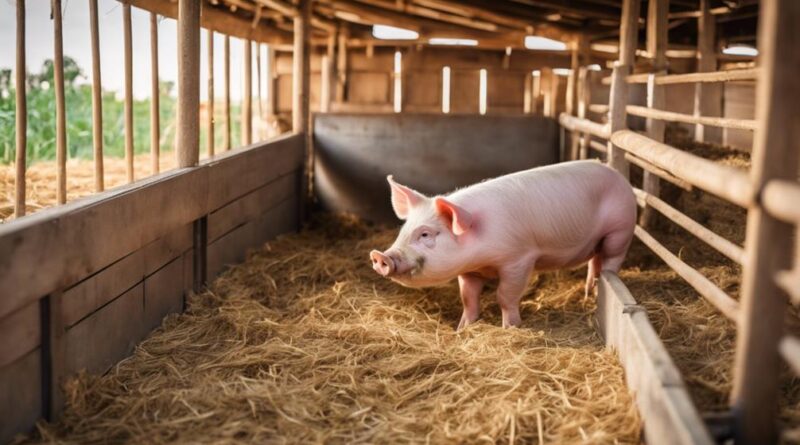Maintaining Pig Health: A Guide to Hygiene Importance
Imagine stepping into the world of pig farming where cleanliness isn't just a courtesy but a shield against unseen adversaries. The well-being of your precious swine hinges on the meticulous care you provide in maintaining hygiene standards.
But, what if there was a simple shift in your approach that could revolutionize the health of your herd and bolster their resilience? Consider the impact of hygiene practices not just on the pigs themselves but on the entire operation.
Stay tuned to discover the key to securing a healthier future for your porcine companions.
Importance of Pig Hygiene
Maintaining proper hygiene for your pigs is crucial for their overall health and well-being. Disease prevention is a key aspect of pig farming, and implementing effective hygiene practices is essential to ensure the well-being of your animals. By following strict hygiene protocols, you can significantly reduce the risk of illnesses and enhance the quality of life for your pigs.
Hygiene practices play a vital role in disease prevention on pig farms. Regularly cleaning and disinfecting living spaces, feeding areas, and water sources can help eliminate harmful bacteria and viruses that can cause infections. Proper waste management is also crucial to prevent the spread of diseases among pigs. By maintaining clean and sanitary conditions, you create a healthier environment for your animals and minimize the risk of outbreaks.
In addition to disease prevention, good hygiene practices are essential for promoting pig well-being. Pigs thrive in clean and hygienic environments, and poor hygiene can lead to stress and discomfort for the animals. Implementing hygiene protocols not only protects your pigs from diseases but also ensures that they're living in a safe and comfortable space. Prioritizing hygiene in your pig farming operations is a fundamental aspect of responsible animal care and can contribute to the overall success of your farm.
Biosecurity Measures for Pig Health
Implementing stringent biosecurity measures is crucial for maintaining optimal pig health and preventing the spread of diseases on your farm. By establishing and strictly adhering to biosecurity protocols, you can significantly reduce the risk of disease outbreaks among your pig population.
First and foremost, controlling access to your farm is essential. Limit entry only to necessary personnel and vehicles, ensuring that all visitors comply with your biosecurity procedures, such as disinfecting footwear and wearing appropriate protective clothing. This helps minimize the introduction of pathogens onto your premises.
Furthermore, proper sanitation practices play a vital role in disease prevention. Regularly clean and disinfect all equipment, housing facilities, and common areas to curb the spread of harmful microorganisms. Implementing a strict hygiene regimen not only protects your pigs but also safeguards the overall biosecurity of your operation.
In addition to these measures, monitoring the health status of your pigs is crucial. Conduct regular health checks, promptly isolate any sick animals, and seek veterinary assistance when needed. Early detection and intervention are key components of effective disease prevention strategies.
Preventing Disease Outbreaks
To effectively prevent disease outbreaks in your pig population, prioritize regular health monitoring and swift intervention when necessary. Disease control and prevention strategies are crucial in maintaining the health of your pigs. Here are three key practices to help you prevent disease outbreaks:
- Vaccination Protocols: Implementing a robust vaccination program tailored to the specific diseases prevalent in your region is essential. Work closely with your veterinarian to develop a vaccination schedule that provides optimal protection against common pathogens.
- Biosecurity Measures: Strengthening biosecurity on your farm can significantly reduce the risk of disease introduction and spread. This includes controlling access to your facilities, quarantining new animals before introducing them to the herd, and regularly disinfecting equipment and vehicles that come into contact with pigs.
- Monitoring and Surveillance: Regularly monitor the health status of your pigs through routine check-ups and diagnostic testing. Early detection of any signs of illness can allow for prompt intervention, preventing the spread of diseases within the herd.
Cleaning and Disinfection Practices
Prioritize cleanliness and thorough sanitation to effectively prevent the spread of diseases and maintain optimal pig health. Effective sanitation practices are crucial in keeping your pig herd healthy. Regularly clean and disinfect all areas where pigs are housed or frequently come into contact with. Utilize appropriate disinfectants that are proven to be effective against common pig pathogens. Follow proper disinfection protocols to ensure thorough coverage and effectiveness.
When cleaning, start by removing all organic matter such as feed spills, feces, and bedding. Use a high-pressure hose to thoroughly wash the surfaces with water. After cleaning, apply the chosen disinfectant as per the manufacturer's instructions. Make sure to let the disinfectant sit for the recommended contact time to ensure maximum efficacy. Pay special attention to areas that are often overlooked, such as corners, walls, and equipment surfaces.
Establish a strict cleaning schedule and stick to it consistently. Regularly monitor the cleanliness of the facilities and adjust your cleaning frequency as needed. Keep records of your cleaning and disinfection activities to track effectiveness and identify any areas that may need improvement. Effective sanitation and disinfection practices are key components in preventing disease outbreaks and promoting the overall health and well-being of your pigs.
Impact of Hygiene on Production
Maintaining proper hygiene practices significantly impacts the overall production efficiency of your pig operation. By focusing on hygiene practices, you can ensure a healthier environment for your pigs, leading to increased productivity and profitability. Here's how hygiene practices can directly influence production efficiency:
- Disease Prevention: Implementing strict hygiene protocols such as regular cleaning and disinfection routines can help prevent the spread of diseases among your pigs. By reducing the risk of illnesses, you can minimize the need for medical interventions and potential production losses due to sickness.
- Optimal Growth: A clean and hygienic environment promotes better growth and development in pigs. By providing a sanitary living space, you create conditions that are conducive to optimal growth rates. Healthy pigs grow faster and more efficiently, ultimately improving your overall production output.
- Feed Conversion: Good hygiene practices extend to feed management as well. Ensuring that feeders are clean and free from contamination can positively impact feed consumption and conversion rates. Efficient feed utilization leads to better weight gain in pigs, translating to improved production efficiency and cost-effectiveness in your operation.
Minimizing Stress Through Hygiene
Promoting tranquility through proper hygiene practices can significantly reduce stress levels in your pigs. Stress management is crucial for maintaining the overall health and well-being of your animals. By keeping their living environment clean and well-maintained, you can help minimize sources of stress that may impact their health.
One way to reduce stress in pigs is by providing environmental enrichment. This includes offering activities that stimulate their natural behaviors, such as rooting and foraging. Enriching their surroundings can keep them mentally engaged and prevent boredom, which is a common source of stress in pigs. Simple additions like hanging toys or introducing new bedding materials can make a big difference in their stress levels.
In addition to environmental enrichment, maintaining good hygiene practices in their living areas is essential. Regularly cleaning and disinfecting pens, feeders, and waterers can help prevent the spread of diseases and keep your pigs healthy. A clean environment not only promotes physical health but also contributes to a calmer and more stress-free atmosphere for your animals.
Maintaining Healthy Environments

To ensure optimal pig health, focus on creating and upholding clean and conducive living spaces. This is crucial for the well-being of your pigs and can help prevent various health issues. Here are some key aspects to consider:
Tips for Maintaining Healthy Environments:
- Environmental Enrichment: Providing your pigs with a stimulating environment is essential for their mental and physical health. Include items like straw for rooting, hanging toys for play, and structures for climbing. Environmental enrichment reduces boredom and aggressive behaviors, leading to happier and healthier pigs.
- Waste Management: Proper waste management is vital to maintain a clean and hygienic environment for your pigs. Regularly remove feces and soiled bedding to prevent the spread of disease and control foul odors. Implementing an effective waste management system, such as composting, can also help reduce environmental pollution.
- Ventilation and Lighting: Good ventilation and adequate lighting are essential for a healthy pig environment. Proper airflow helps to control humidity levels and prevent respiratory issues. Natural or artificial lighting should mimic natural day-night cycles to regulate pig behavior and promote better health.
Training for Hygiene Compliance
Ensuring proper hygiene practices are followed consistently is essential for maintaining the health and well-being of your pigs. Hygiene training plays a crucial role in ensuring that all individuals involved in pig farming understand the importance of cleanliness and follow best practices. It's important to provide thorough hygiene training to all personnel working with the pigs, including cleaning staff, handlers, and caregivers.
Hygiene training should cover a range of topics, including proper handwashing techniques, cleaning and disinfection protocols, waste management, and biosecurity measures. By educating your team on these practices, you can help prevent the spread of diseases and maintain a healthy environment for your pigs.
Compliance monitoring is an integral part of hygiene training. Regularly observe and assess whether the hygiene protocols are being followed correctly. Provide feedback and reinforcement to encourage continued compliance. Implementing a system for monitoring and documenting adherence to hygiene practices can help identify areas that may need improvement and ensure that standards are consistently met.
Frequently Asked Questions
How Often Should Pig Farmers Consult With Veterinarians for Advice on Maintaining Pig Health Through Hygiene Practices?
You should consult with veterinarians regularly for advice on maintaining pig health through hygiene practices. Regular veterinarian consultations are key to preventing diseases and ensuring effective hygiene practices for your pigs.
Are There Specific Hygiene Practices That Are More Effective for Preventing Certain Diseases in Pigs?
To prevent diseases in pigs, focus on specific hygiene practices. Sanitation methods like regular cleaning and disinfection can help. Implement hygiene protocols that target respiratory illnesses, such as proper ventilation and isolation of sick animals.
What Are Some Common Signs That a Pig May Be Experiencing Stress Due to Poor Hygiene Conditions?
If your pig is stressed due to poor hygiene, watch for signs like decreased appetite, restlessness, and excessive scratching.
Hygiene importance is crucial for your pig's well-being.
Consulting with veterinarians can help address these concerns and improve your pig's health.
How Can Pig Farmers Effectively Monitor and Maintain Proper Hygiene Levels in Large-Scale Pig Farming Operations?
To effectively monitor and maintain proper hygiene levels in large-scale pig farming operations, you need to focus on biosecurity measures and disinfection protocols. Implement strict waste management practices and adhere to regular cleaning schedules.
Are There Any New Technologies or Innovations in Hygiene Practices That Are Being Developed for Pig Farming?
When it comes to pig farming, you might be curious about the latest in hygiene practices. Well, there are indeed new advancements in hygiene technology and innovative solutions that are being developed for pig farming.
These advancements aim to make maintaining hygiene levels easier and more effective in large-scale operations. Keeping an eye on these developments can help you stay ahead in ensuring the health and well-being of your pigs.
Conclusion
In conclusion, maintaining proper hygiene practices is crucial for keeping your pigs healthy and productive. By implementing biosecurity measures, preventing disease outbreaks, and practicing regular cleaning and disinfection, you can minimize stress and create a healthy environment for your animals.
Remember, good hygiene not only benefits the pigs but also contributes to the overall success of your operation. Stay committed to hygiene protocols to ensure the well-being of your pigs and the success of your farm.
